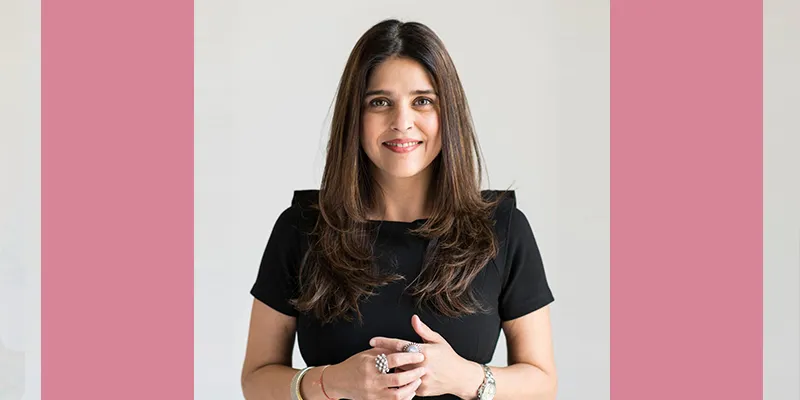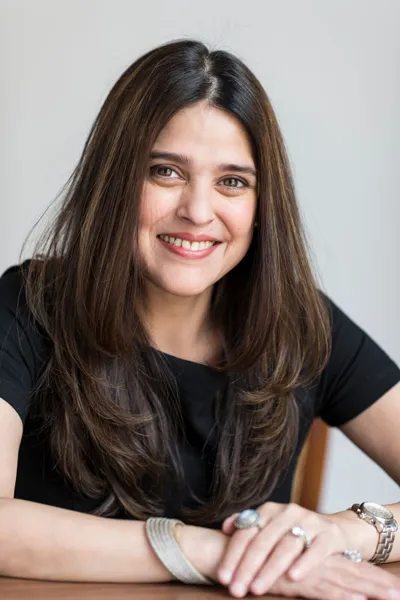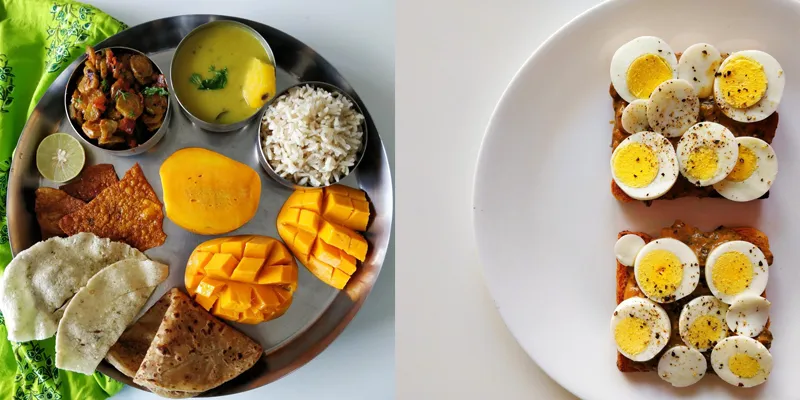‘Gutless’ foodie Natasha Diddee’s quest to choose living over existing
Life without a stomach can be devastating for anybody, but none more than a chef. Here’s how Natasha Diddee turned her pain into her power.
For Natasha Diddee’s 80,000, and growing, number of followers on Instagram, her adventures with food rouse and motivate beyond their gastronomical merit. The 44-year-old chef lost her entire stomach to two perforated ulcers and a tumour in 2012. Determined not to approach her second shot at life through the lens of fear, she got off the operating table, and into her kitchen to find ways to rise above her condition.
Today, she is a famed food blogger and a social media star, with people lauding her bravery for staying committed to her passion. An in-depth conversation reveals it was not a single surgery that equipped her with such astounding levels of resilience. Hers has been a long and turbulent journey towards self-awareness, one she hopes will inspire others to make cathartic choices in their own lives.

A creative childhood
Natasha remembers being surrounded by creative stalwarts while growing up. “My grandfather’s best friends were M.F. Hussain, Manohar Malgaonkar, and Mario Miranda. Pandit Shivkumar Sharma was a neighbour. I call Gulzar uncle because I studied with his daughter, and am still close with her. I was like a sponge, learning from and absorbing this atmosphere,” she says.
She dabbled in various areas in high school, be it swimming, theatre or painting, to explore her artistic instincts. But when it was time to decide on a career, she settled on food. She loved cooking as much as she loved eating, and could not see another field in which to pour her blood, sweat and tears into.
Life’s other plans
Natasha trained as a chef at the Indian Institute of Hospitality and Management, Catering Technology & Applied Nutrition (IHMCTAN) as well as Sophia Polytechnic in Mumbai, and began working in junior positions at five-star hotels like the Oberoi and Taj. “I just love the energy of industrial kitchens. It made me so happy to be a part of a perfectly in sync team chopping, sautéing and frying away to create beautifully plated dishes,” she says wistfully.
At 22, Natasha got married and moved to Delhi, where a shock awaited her. Her husband and in-laws did not permit her to work in kitchens. “They were not against me working per se. But professional kitchens have weird time shifts they were not okay with. So, that was the end of my culinary career as I knew it,” she says.
Her marital home turned out to be very difficult to adjust, and she would call up her batchmates, who were placed in various restaurants in the city, and ask to work in their kitchen. “I didn't want to get paid. I just wanted to be around that high energy buzz of industrial kitchens and practise my craft. Also, I needed to get out of the house,” she remembers.
As her home environment continued to deteriorate, Natasha began job hunting. She applied at various embassies as a government work schedule was found acceptable by her in-laws. “The stress at home was taking a serious toll on my health. But I was very young then and hated confrontations. I did not know to stand up for myself then as I do now,” she says.
As luck would have it, the Turkish embassy had a job opening and she was selected. “When my ambassador was leaving, he recommended me to the Belgian ambassador. Thus, my career in a completely unforeseen arena took off,” she says proudly.
New beginnings
After five years of being in an unacceptable marital situation, Natasha had finally had enough. She says, “In my marriage I felt inferior, like I was

never good enough. When I finally made the decision to leave that house, and that marriage, it gave me a sense of empowerment.”
What had begun as an escape quickly became a haven. Working in the embassy, soaking in the confluence of cultures and reclaiming her life; Natasha was finally getting her long-deserved chance at happiness. And then she found love. “Bengt Johansson was the Swedish trade commissioner and I was managing the brand of Sweden in the embassy. Our paths crossed a lot. We worked so close together, our sensibilities matched and I was lucky enough to have found my soulmate,” she smiles.
She moved to Bengaluru as Bengt had to open the Swedish Trade Commission. “I was under the impression that, with my track record, a job in Bengaluru was destined for me. It seemed like getting a job in Bengaluru was not going to happen for me at all,” she says.
She started her own real estate firm in the city and made it a hugely profitable venture. When Bengt chose to work for a company in Pune, she shut it down.
Disasters
Natasha had begun to feel pain in her stomach a year after she walked out of her marriage. At first, she didn’t think much of it, but as it continued to grow more acute, she sought medical treatment.
The phrenic nerve extends below the diaphragm and sends signals to the brain if the organs are in distress. When we hiccup, it’s the phrenic nerve telling the brain that something is not right with a vital organ. The nerve is connected to a tip on the left shoulder. Natasha’s distress originated in her stomach, but she felt the pain in her shoulder. Her doctor performed two shoulder surgeries, but failed to solve the problem.
“If a doctor tells you that you need something, especially when you are in that much pain, you do it,” says Natasha. Another doctor subjected her to three bouts of radiation without even knowing if she had a tumour. As the years passed and the pain became unbearable, she even went to Sweden for treatment. But to no avail.
When Natasha would ask her doctors to increase the dose of painkillers she was on, they called her a junkie. After five years of this hellish nightmare, the family was finding it hard to hold on to hope. At her healthiest Natasha had weighed 88 kg. Now she was 38; her haemoglobin count was 4. She had given up eating and was finding it hard to keep water down. “The doctors told my parents to take me home and let me go in peace,” she recalls.
A ray of hope
When Dr Suryabhan Bhalerao, a surgeon at KEM Hospital in Pune, saw Natasha, he guessed right away that she had at least one, if not more, burst ulcers. “By the time Dr Bhalerao came to see me, I was doubled over with pain on the floor and sitting on my haunches as it was the only position that offered a modicum of relief,” says Natasha.
He sprang into action and ordered blood transfusions to get her haemoglobin count up. Then he operated laparoscopically to determine the damage. “What he saw gave him the shock of his life,” she says. “There was a tumour growing around my stomach and there were two ulcers that were bleeding and were rubbing around each other. That's why I couldn't even drink water.”
Killer stress
In hindsight, Natasha realises how much the modern epidemic of stress is to blame for her disease. An abusive marriage, the death of a beloved pet, and loss of a successful business had all contributed to her condition. But there is something else.
“I don’t know about other cultures, but I’ll tell you about India. We live with a lot of opinionated people. They make you second guess yourself, are negative, and put me down at every chance. Post the operation, I decided that if they can't impact me positively, I don't need them in my life.”
Natasha believes that while many people might share her sentiments, they do not act on it for fear of hurting their parents.
Healing journey
After an exhaustive eight-hour surgery, which necessitated the removal of her stomach, began another tricky adventure. “Nobody told me that my stomach had been removed. Because I didn’t feel hungry I didn’t eat, getting nourishment through IV drips instead. Some well-wisher had left a box of cookies on my side table. I casually ate one. My mother, who was in the washroom, came out in time to see me about to tuck into another. All hell broke loose as doctors, nurses and my family began screaming at me and pulling heavy machinery around me. ‘You don’t have a stomach,’ my mum kept shouting. I looked down at my abdomen, afraid to find a vacuum of air,” she recounts.
Natasha’s parents had hoped to break the news to her gently. But she is thankful the opposite happened. “I didn’t enter into this with fear,” she says. “I ate a cookie and was still alive. The worst had happened. Now I was determined to get re-acquainted with my body on my own terms and heal myself through food.”
Natasha focuses on wholesome ingredients and traditional recipes in her diet. Processed packaged food items have no place in her kitchen. “It's a process and I am still learning. But I've found that I need to eat like a diabetic. I avoid simple carbohydrates. The concept of breakfast, lunch and dinner doesn't exist for me. Since I don't feel hungry, I eat out of greed now. But I only take a couple of bites at a time. Then maybe an hour later, when I feel my energy levels flagging, I'll return to the snack and eat some more,” she shares.

Where there’s a will
Natasha didn’t know that not having a stomach means she has to sleep at an angle and is frequently in extreme physical discomfort.
“People just assumed that I was a gone case. How can I live without a stomach? I guess that's what fuelled me. It was that pity I saw in people's eyes. I decided I would change that look into awe. Right now, when you're looking at me, do you think I am in any discomfort? On a scale of 1 to 10, right now, I am at an 8. But I will never let you see that. A big part of healing is to get people to stop feeling sorry for you. I developed a strategy. I willed myself. The mind is very powerful,” she asserts.
There’s much more to Natasha’s life than food. Since her surgery, she has launched her wildly popular social media page, written a wildly popular novel called Fooursome and travelled to many countries. After receiving repeated offers, she is now considering becoming a motivational speaker. “I don't know if am motivational enough. But I would like to use my story and my learnings for the greater good if I can,” she says.
Her parting advice is to have a deep reckoning with yourself: “We are all very shallow people, all of us. That is until you go through a big challenge or a big block. You are forced to go deep within to realise how shallow you are. It's the biggest cleansing we go through. It's harder to do a mental cleanse than a detox green juice cleanse. We make so many mistakes all our lives that has buils up this big block. We have to dismantle our blocks brick by brick.
“My suggestion, to whoever is going through whatever block, is make that time to go within. It is worth it. You will face your demons. You will hate yourself. You will love yourself. Only by listening to your soul will you be able to move forward.”







